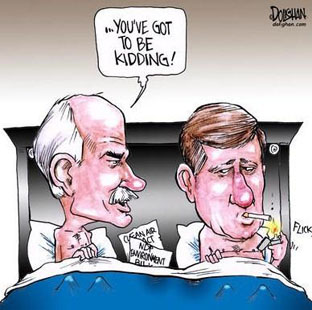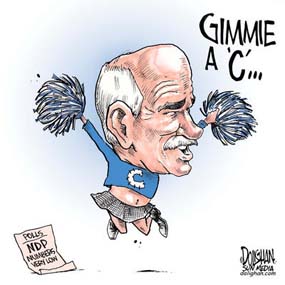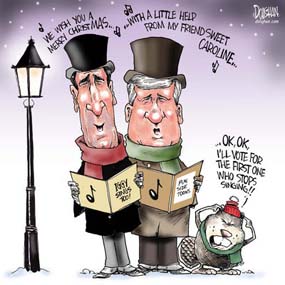Will Con-NDP “coalition” be big Ottawa surprise of 2011?
Jan 3rd, 2011 | By Citizen X | Category: Ottawa Scene
On January 1, 2011 a crowd gathered in Herring Cove, just south of downtown Halifax, to watch brave souls take the plunge at the annual polar bear dip into the North Atlantic Ocean. Photo: Ingrid Bulmer / Halifax Chronicle Herald.
Just for starters, if there is not going to be a Canadian federal election this year at least one of the three opposition parties will have to vote with the Harper Conservative minority government on the budget “expected to be brought down in March.” Liberal leader Michael Ignatieff “says he wants to see the budget before committing himself, but he has ‘low expectations’ it will contain policies that his party can support.” (And then there is John Ibbitson’s report from a few weeks ago: “Ignatieff set to trigger election call in New Year.”)
In late November it was said that the Bloc Québécois might step up to this particular plate – taking us back to where the Harper minority governments began, in 2006 and 2007. Reuters was still predicting just a few days ago that the “government might persuade the separatist Bloc Québécois to support the budget in exchange for a tax deal with the province of Quebec. The Bloc backed two previous Conservative budgets, keeping the government in power.”
Other sources suggest the Conservatives now believe that the optics of any kind of deal with “separatists” have gone beyond the pale. Or, as Bill Curry urged in a provocative December 28 piece in the Globe and Mail: “Mr. Harper vilified the Bloc Québécois as ‘separatists’ in his successful campaign to torpedo the 2008 move by the Liberals and NDP to form a coalition government with Bloc support, leaving the NDP as his only remaining dance partner.”
Mr. Curry’s late December report went on: “NDP finance critic Tom Mulcair said he agrees with Finance Minister Jim Flaherty’s recent assessment that the two of them found some common ground during a private meeting on the budget. He said those areas included a need to help low-income seniors – perhaps by enhancing the Guaranteed Income Supplement – and possibly renewing incentives for energy-friendly home renovations. Mr. Mulcair said polling shows no party stands to gain now from an election.” Mr Curry noted as well that: “The Prime Minister’s spokesman, Dimitri Soudas, also singled out NDP Leader Jack Layton’s efforts for praise in an e-mail this week to reporters announcing the government would invite Burmese pro-democracy leader Aung San Suu Kyi to Canada. “
* * * *
All this had been pre-figured on December 16, when Reuters reported: “Canada’s left-leaning New Democratic Party suggested … it might back the government’s next budget, a move that would help the ruling Conservatives avoid an election widely expected in 2011 … New Democratic Party leader Jack Layton said his party had proposed a number of measures for the next budget and it was now up to Harper to respond … Pressed as to whether he might consider backing the budget if it contained measures the NDP wanted, Layton replied: ‘We have a track record of being willing to work with other parties when they are ready to do the right thing. We’re not changing that approach’ … The New Democrats – who oppose what they say are unnecessary corporate tax cuts – want more aid for the elderly, a cut in taxes on home heating fuel as well as targeted investments in domestic manufacturing.”
And then, on the very last day of 2010, the Ottawa Citizen opined: “As 2010 comes to a close, there are some subtle signs that a shift may be coming to Parliament Hill. After attacking coalitions as undemocratic in 2008 when the Liberals and NDP joined with the Bloc Québécois to try to defeat his newly elected government, Harper’s Conservative government seems to be finding more common ground with the NDP on issues such as helping low-income seniors in the upcoming budget. The warming trend between the parties on the right and the left of the Canadian political spectrum comes at a time when Canada’s newly appointed Governor General David Johnston has also, significantly, said there is nothing wrong with coalition governments … A move toward co-operation, if it takes hold, would be a good new trend in federal politics. It could also indicate an overall warming that sees more work getting done in a better functioning Parliament. It’s worth hoping for.”
Some will of course downplay the concept of even a very informal and transient Conservative-New Democrat “coalition” as an ideological monstrosity. But, just to start with, it was Jack Layton and the New Democrats who helped the Harper Conservatives defeat Paul Martin’s Liberal minority government back in late 2005 – and set the stage for the shaky triumph of the first Stephen Harper minority government in 2006. And then, as is still not all that widely known, Mr. Layton’s father and grandfather were both active Quebec Conservatives. (Mr. Layton himself often enough looks like a creature of the old Anglo Montreal Tory elite.)
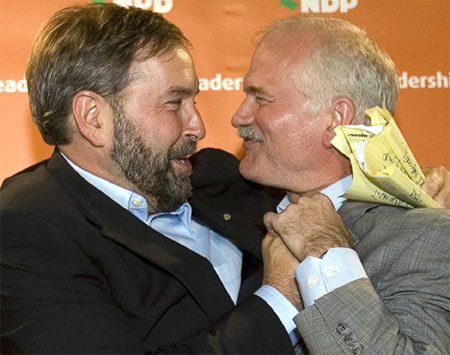
Thomas Mulcair, a former Quebec Liberal and Jack Layton, whose father and grandfather were Quebec Conservatives, are now both in the NDP, and pleased about something in this photo.
The Layton New Democrats have also experimented with strategic support for the minority governing Harper Conservatives in the past. (Think “Employment Insurance benefits” in the fall of 2009: or as Mr. Layton told Reuters recently: “‘We have a track record of being willing to work with other parties when they are ready to do the right thing.”) Conservative PM Harper has appointed the former NDP Premier of Manitoba, Gary Doer, as Canada’s Ambassador to the United States. (And even more significantly, perhaps, Mr. Doer accepted the appointment – motivated in some degree, it seems, by some degree of shared Western Canadian populist loyalties among Western Canadian Conservatives and New Democrats). And, finally, New Democrats cannot be happy when they read such recent headlines as “Ignatieff out to lure voters from the NDP, Bloc.”
There are as well, it is certainly worth underlining, for the moment at any rate, an assortment of signs that do suggest even a very informal and transient Conservative-New Democrat “coalition” could prove unworkable in the end.
Thomas Mulcair also told Bill Curry last week: “If the budget includes the same type of blind, across-the-board corporate tax cut that the Conservatives have been doing in the past, it is highly unlikely that the NDP caucus would ever be able to support such a budget.” And then the very next day, in a piece entitled “Tories need to refocus after political shocks of 2010,” John Ibbitson was writing in the Globe and Mail: “The question is whether Mr. Harper is willing or able to return to his conservative roots in 2011, or whether he will rely on disarray among the opposition to keep himself in office … For Conservatives both inside and outside the government, the key priority now must be restraining spending and balancing the federal budget … It won’t be easy.” (Especially, you might guess, if the budget has to be in some degree tailored to ensure support from even Jack Layton’s New Democrats?)
And then again too, on the very same day as Bill Curry’s “Tories soften tone with NDP ahead of 2011 budget,” Lawrence Martin was presenting (in the same newspaper) a rather different picture of the former Quebec Liberal Thomas Mulcair: “Mr. Mulcair has an ego the size of Mount Kilimanjaro, with talent and temper of almost the same magnitude … Being a former Liberal, Mr. Mulcair has no doubt the two parties can work together. [And in this case Mr. Mulcair does not mean the Conservatives and the New Democrats!] ‘On the centre-left, we have to be just as smart as conservatives were on the centre-right when they coalesced. We’ve got to learn from that, otherwise we’ll end up with Harper governing with 37% of the vote again’ … The NDP, he says, is sending a clear signal. ‘People can trust us to work with anyone else who wants to give voice to the 65% of Canadians who are asking for a more progressive form of government’ …”
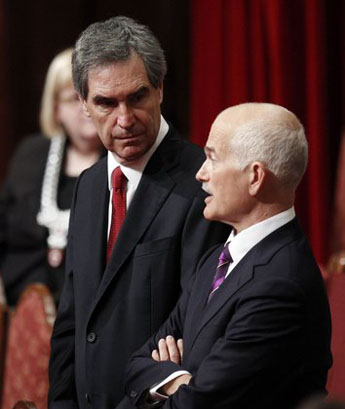
Liberal leader Ignatieff and NDP leader Layton talk before David Johnston is sworn-in as Canada's 28th Governor General during an October 1, 2010 ceremony in Ottawa.
This sounds a little more like an editorial in today’s Toronto Star: “The Conservatives could strike a deal with one of the opposition parties to push through a package of significant measures – as, say, the British Conservatives have done with the Liberal Democrats, or the Ontario Liberals did with the New Democrats in 1985. There is nothing unholy, or even unparliamentary, about such arrangements … But since Harper demonized the very idea of a coalition government when it was first raised by the opposition parties two years ago, it is highly unlikely he will make such an offer … Given the alternative, then, it is probably better that we have an election in 2011. The odds are that it would produce the same result as in 2008 and 2006, but the post-election dynamic could be very different this time. The opposition parties could get together immediately after the vote to appeal to the Governor General for a change of government. With the record of the past five years, it would be hard for him to say no.”
